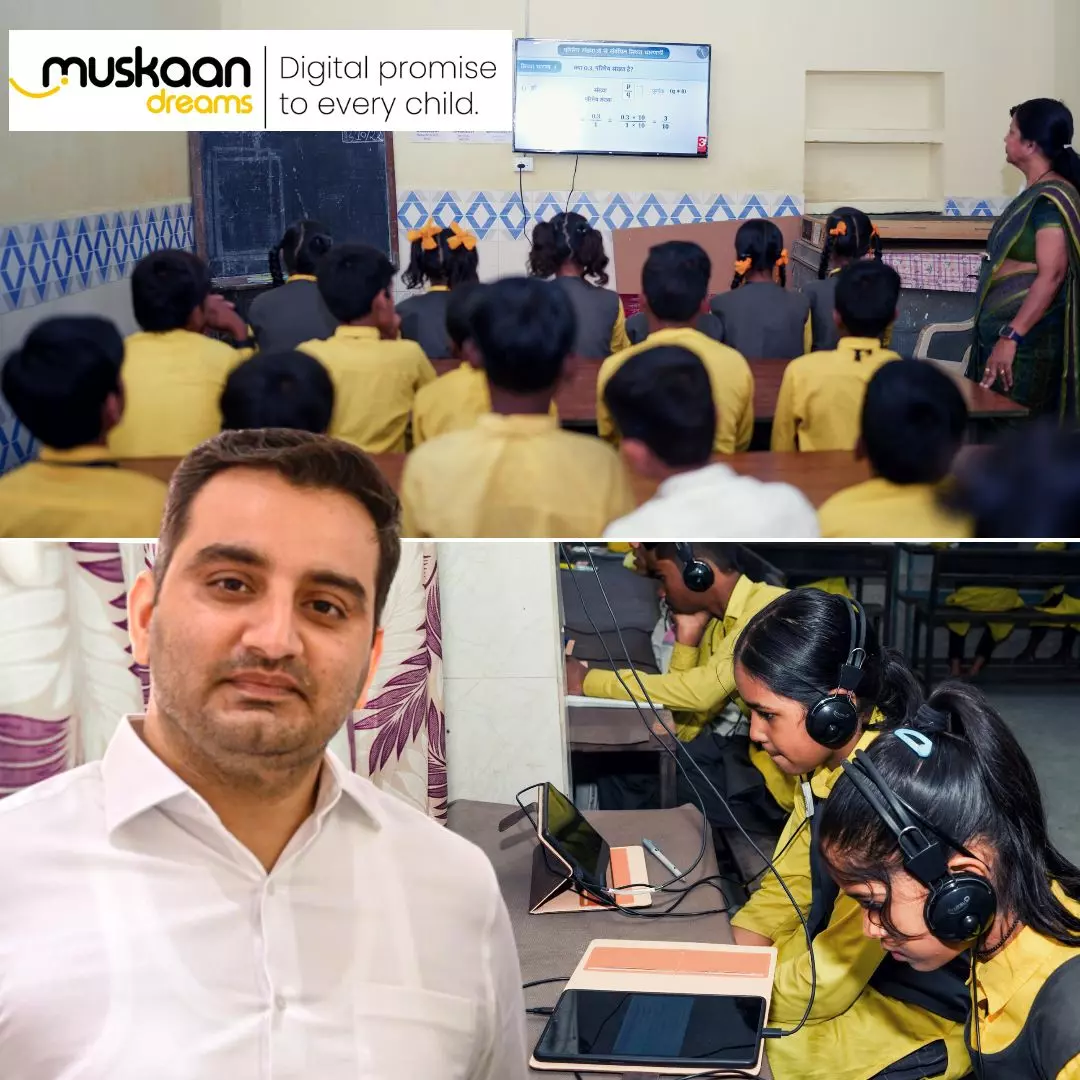
Image Credit: Muskaan Dreams
Addressing Digital Divide In India! This Non-Profit Envisions To Transform Learning Experiences Of Children In Public Schools
India, 7 Dec 2022 9:22 AM GMT
Editor : Jayali Wavhal |
She writes about gender issues, human interest, and environment.
Creatives : Ronit Kumar Singh
A confident and reliable journalist who always desires to toss the unheard voices. I cover politics and governance extensively through stories.
With the increase in digitisation of education come several challenges concerning digital inequality in the country. To combat the issue, Muskaan Dreams was founded in 2017 with the aim to transform the learning experiences of children in public schools by providing them access to digital learning tools.
The increase in the use of technology has led the education sector towards the era of 'digitisation.' It has not only improved the quality of education but also made the learning process more enjoyable and effective. The New Education Policy (NEP) 2020 also draws guidelines for developing digital infrastructure, online teaching platforms, and tools.
However, the digitisation of education comes with a specific set of challenges concerning digital inequality in the country, which wasn't addressed until COVID-19 widened the inequality gap. According to an NSS report (2017-18), only 23.8 per cent of Indian households had access to the internet, and the number drops to 12.5 per cent when the number of Indian households with students who have access to the internet is considered.
Across the country, when every educational institution shifted to an online mode of education during the pandemic-led lockdown, numerous public schools suffered due to a lack of digital resources. The students belonging to unprivileged segments of society living in remote areas were the worst hit because of their inability to afford internet services or technical devices.
The pandemic accelerated online learning, but public schools are still most unprepared, due to which students and teachers face challenges while getting to these online platforms and processing efficient teaching and learning. While talking with The Logical Indian, a government school teacher from Hajipur, Bihar, Ritesh Tiwari, mentioned that he didn't know how to use digital tools (Zoom, Whatsapp) when the schools were forced to shut down due to the pandemic. Due to this, the learning outcomes of several students were affected.
Digital Promise To Every Child
To combat the digital divide in the country, Muskaan Dreams, an award-winning social impact non-profit organization, was founded in 2017 by Abhishek Dubey. It aims to transform children's learning experiences in public schools by providing them access to digital devices and internet connectivity to make learning enjoyable, easily reachable, and accessible.
They aim to accomplish their aim by empowering teachers and building their digital capacities, directly impacting students' learning outcomes. Currently, Muskaan Dreams is working with 500+ govt. schools, 100k students, and 2000+ teachers across Madhya Pradesh, Uttar Pradesh, Maharashtra, and Rajasthan.
They plan to reach one million students by 2025. Due to their empowering steps and initiatives, the non-profit organisation was recognised in 2019 by Forbes Asia.
'Digital Shaala' Initiative
Through the 'Digital learning classroom' or 'Digital Shaala' initiative, the purpose-driven organisation aims to improve schools' quality and class delivery model to ensure teachers' digital capacity building.
While sharing the information with The Logical Indian, the organisation mentioned, "We provide digital access by distributing tabs, computers, and smart TV to public schools. We also provide internet access, high-quality content, teacher training, and on-ground technical support to public schools and teachers." They added, "Digital learning classroom helps teachers deliver learning in a better way than other ways of teaching. The enjoyable content helps students in the deep understanding of subjects."
Decoding The Need To Address Digital Divide
According to a World Economic Forum Study, 88 per cent of surveyed teachers were found facing challenges in teaching students during COVID-19, out of which 72 per cent encountered hindrances due to a lack of resources like the internet, technical devices, and electricity, among others.
The report also highlights the lack of digital training for teachers, as 34 per cent of surveyed teachers mentioned that no training was conducted for them during COVID-19. The other 66 per cent reported that only a few program-related training sessions were conducted. It was also found that no digital skill training was provided to teachers during the pandemic days.
From the student's perspective, the survey revealed that only 25 per cent of learners have access to digital devices at their schools, 13 per cent have computers, 10 per cent claimed that they have TVs in their schools, and 2 per cent were found to have projectors.
Another challenge in accessing online education is the lack of technical devices at home, which enable students to get distance education. The survey report highlights that 62 per cent of students have access to just one smartphone at home, which is a major challenge, 26 per cent have two or more than two smartphones, and the remaining 12 per cent were found to have no access to smartphones.
The above data highlights the importance of addressing digital inequality in India. While some privileged students are empowered with modern gadgets and digital infrastructure, the students from the underprivileged section suffer due to their inability to access digital tools.
The non-profit organisation is working to empower students to make them future leaders. The Logical Indian extends warm wishes and all the luck to the purpose-driven team of volunteers in their journey of bridging the gap between education and employability among the rural population of children by providing them access to digital learning and thereby building digital literacy in India.
 All section
All section














